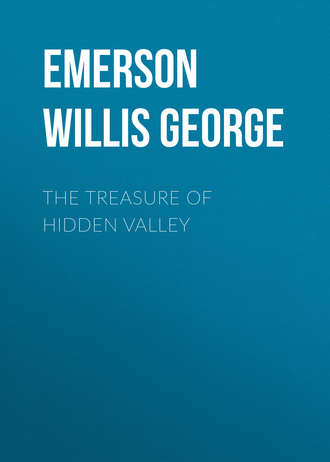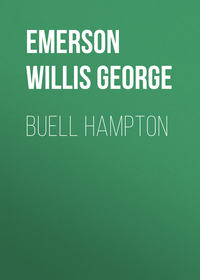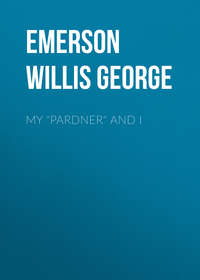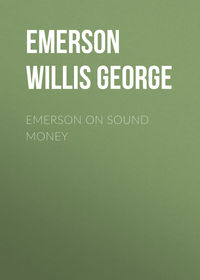 полная версия
полная версияThe Treasure of Hidden Valley
“Is this a vision?” he asked feebly, as if doubting his senses.
“Roderick, my dear fellow, is it really you?” exclaimed the Major, as he bent down over him. “For days we have been hunting for you. And now we’ve found your hotel” – he glanced around with a little smile – “we don’t propose to lose sight of you again.”
Loosening his hand from Gail’s and taking both of hers in his own and smiling feebly, Roderick said: “Really, Gail, I hardly know yet whether you are actually here or I am dreaming. You looked pretty white that day I carried you from the hotel.”
“There is no dream about me, Roderick,” replied Gail brightly. “We are going to take care of you, Major Hampton and myself, just as you so kindly looked after poor little me.”
At this moment a nurse approached: “So your friends have found you, Mr. Warfield?” she said with a cheerful smile.
“Yes,” replied Roderick, “the very best friends I have in all the world.” As he spoke Gail felt the gentle pressure of his hand.
“Is this your ward?” inquired the Major of the nurse.
“Yes, I have had charge of it ever since this makeshift hospital was put up.”
“Well, how is the patient, our friend Mr. Warfield?”
“He had received a pretty ugly cut – a falling piece of wood or something of that sort – on the top and side of his head – a sort of glancing bruise. But he is getting on very well now. We have his fever under control. For a number of days he was very flighty and talked a great deal about Major Hampton.”
“I am honored,” said the Major, bowing.
“Oh, you are Major Hampton?”
“Yes,” said Gail, “Major Buell Hampton is Mr. Warfield’s best friend – that is, one of the best.” And she looked quickly at Roderick.
“How fortunate that you have come when he is convalescing. But tell me,” asked the nurse, “who is Gail? In his delirium he talked a great deal about her.”
Roderick’s face flushed, and Gail with rising color immediately changed the subject by asking: “How soon would it be safe to have the patient removed?”
“Oh, perhaps tomorrow or the next day. The doctor says he is now quite out of danger – the fever is practically gone.”
At Roderick’s request he was propped up on his little white iron hospital cot, chairs were brought, and until far on in the afternoon Gail and the Major sat on either side, conversing in quiet, subdued tones, relating incidents in the terrible disaster, planning for their early return to Wyoming just as soon as Gail’s father and Roderick himself could stand the journey.
A couple of days later Buell Hampton and Gail arrived at the hospital in an automobile, and carried Roderick away to a yacht anchored in the bay that had been placed at their disposal. Here Roderick found General Holden already installed in a comfortable deck chair, and he was introduced by Gail to her Uncle Edward, a hale old gentleman bearing a striking resemblance to his brother. The General looked fit even if he did carry his right arm in a sling, Roderick although weak from loss of blood was able to walk, and both could well congratulate each other on their providential escape.
“We are not going to talk about these awful times,” said the General as he gave Roderick his left hand and returned the cordial pressure. “But I have to thank you for saving our dear Gail. We all fully realize that without your brave and timely help we would not have her with us today.”
“Nonsense,” protested Roderick. “Somebody else would have done what I did. I was just happy and lucky in having the privilege.”
“God bless you!” murmured the father, again pressing the hand which he had not yet relinquished.
“And so say I,” exclaimed the uncle. “We could not do without our little Gail.” And he patted her cheek affectionately.
There followed a week of blissful rest and happy companionship, at the end of which it would have been a hollow mockery to pretend in the case of either invalid that any more nursing or lolling in long chairs was required. Railroad accommodations were secured for the morrow.
CHAPTER XXXIX – REUNIONS
TEN days before the departure from San Francisco telegrams had been sent in all directions giving forth the glad tidings that General Holden and Gail, Roderick and Buell Hampton, were safe and would soon be on their homeward way to Wyoming. Among those thus notified had been the Shields family at Los Angeles and Allen Miller at Keokuk. But it was a great surprise to find Whitley Adams waiting the arrival of the morning train at Rawlins with his big Sixty Horse Power automobile, and bearing the news that Mrs. Shields, Barbara and Dorothy had returned, while also Uncle Allen and Aunt Lois had come to Encampment so that appropriate welcome might be given to those who had recently come through such terrible and harrowing experiences. Jim Rankin and Tom Sun were also on the platform to exchange hand-grips with Roderick and the Major.
After the first glad salutations Whitley pointed to his car, and announced that he was going to drive the party over to Encampment.
“Sorry to be starting in opposition to the regular stage,” he said with a sly little wink in Roderick’s direction. “But you see Mr. Rankin’s horses are hardly good enough for the occasion.”
Jim drew himself up and pointed to his old Concord stage coach standing by, all ready for the road.
“The dangnationest finest pair uv roan leaders and span uv blacks at the wheel that ever had lines over ‘em in this part of the country,” he declared sturdily. “Just wait a bit, young man. ‘Fore we’re many miles on the road I make free to prognosticate you’ll be under the bed-springs uv that new fangled wagon uv yours and my hosses will be whizzing past you like a streak uv greased lightnin’. How would a little bet uv ten or twenty dollars suit you?”
“Oh, bankers never gamble,” replied Whitley with undisturbed gravity. “Well, you’ll follow with the luggage, Mr. Rankin, and no doubt we’ll have the pleasure of seeing you again sometime tomorrow. Come away, Miss Holden. Luncheon is to be waiting at my hotel in Encampment in a couple of hours.”
“Blame his skin,” muttered Jim when the big automobile had whirled away. But Tom Sun was convulsed with laughter.
“He got your dander fairly riz, Jim,” he chuckled.
Jim’s visage expanded into a broad grin.
“Guess that’s just what he was arter. But ain’t he the most sassy cock-a-whoop little cuss anyhow?”
“Shall I help you with the luggage?” laughed Tom Sun.
“Oh, you just quit the foolin’ game, Tom. Don’t come nachural from you. Besides I might be gettin’ a heap peevish and kind o’ awkward with my artillery. Suppose we lubricate?”
So the old cronies crossed over to the Wren saloon, where a brace of cocktails soon restored Jim’s ruffled dignity.
Meanwhile the automobile was speeding along.
Roderick was on the driver’s seat beside Whitley, and absorbing the news.
“Oh, I just insisted on your Uncle Allen coming along,” Whitley was telling him. “And Aunt Lois, too. My old folks will arrive at the end of the week. Meantime Aunt Lois is helping me with my trousseau.”
“Your trousseau!”
“Yes – socks and things. You see it’s all fixed up between me and dear Dorothy. Oh, she’s the best girl ever – you’ll remember I said that from the first, Rod, my boy.” His face became grave, and his voice took a humble tone. “Of course I know I can never, fill the place of Grant Jones, and I told her that. But I’ll do my best to make her happy, and I think she cares enough for me to let me try.”
Roderick pressed the hand next him resting on the steering wheel.
“I’m sure you’ll be very happy, both of you,” he said; “and I congratulate you, Whitley, old fellow, from the bottom of my heart.”
Whitley looked round and was his gay, light-hearted self once again.
“Thanks, old chap. Well, Barbara and Ben Bragdon are also ready. We’re only waiting for you and Gail.”
Roderick’s face reddened.
“You’re mighty kind but rather premature, I’m afraid.”
“Oh, fudge and nonsense! We’re all agreed the thing’s settled, or as good as settled. Great guns anyone with half an eye could have told it, to see you handing her out of the train a little while ago.”
“Really, Whitley.”
“There now, just forget all that. So when talking matters over with Bragdon and our dear twins I suggested that we might as well ring the wedding bells for six as for two at a time – may come cheaper with the Reverend Grannon, you know, if we hand it to him wholesale.”
Roderick no longer attempted to protest, and Whitley rambled on: “But, say, old fellow, your Uncle Allen has one on you. He declares that Gail Holden is just the very girl he intended for you right from the beginning – the young lady about whom you kicked when you had that row in the banker’s room a year and a half ago – Great Scott, how time does fly!”
“Impossible,” exclaimed Roderick in profound amazement
“The very same,” replied Whitley. “The little tot of a girl with whom you had that desperate love affair down the river years and years ago – oh, quite a pretty story; your uncle told it to me with no end of charming details. And now he is mighty proud, I can tell you, over his own foresight and sagacity in picking just the right girl for you at the very start.”
“He said that, did he?” queried Roderick with a grim smile.
“Yes, and that if you had followed his advice you could have had her then, without running away from home and facing all sorts of hardships and dangers.”
“No, sir,” exclaimed Roderick firmly. “Gail Holden is not that sort of girl. Uncle Allen forgets that she had to be won – or rather has to be won,” he added, correcting himself when he caught the smile on Whitley’s countenance.
“Well, you won’t forget,” laughed Whitley, “that I stood out of the contest and left the way clear for you. Lucky, though, that the College Widow took the bit between her teeth and bolted, eh, old man?”
“Hush!” whispered Roderick, throwing a warning glance over his shoulder.
“What are you two boys talking about?” asked Gail, with a bright smile from her seat at the back of the tonneau.
“Old college days,” laughed Whitley, as he changed the clutch for a stiff up-grade.
Arriving at Encampment, they found Allen Miller walking nervously up and down the platform in front of the hotel. The red blood in Roderick’s veins surged like fierce hammer strokes, with eagerness to once more grasp the hand of his old guardian.
He hastily excused himself, jumped from the auto and grasped the extended hand of his old guardian. He was soon led away by his uncle Allen, to the parlors of the hotel, to meet his Aunt Lois.
“Oh, I am so glad you brought Roderick here, Allen; for I just knew that I would get all fussed up and cry.
“There, there, Aunt Lois,” said Roderick cheerily, after embracing her warmly, “we are not going to be separated any more, – or, if we are, it will not be for long at any one time. I know the way back to old Keokuk,” said Roderick, laughing and hugging his dear aunt Lois again, “and you and Uncle Allen now know the road out to the Wyoming hills.”
“I declare, Lois,” said Uncle Allen, “you and Roderick act like a couple of school children.” He laughed rather loudly as he said this, to hide his own agitation; but it was noticed that his eyes were filled with tears, which he hastily brushed away.
It was a happy luncheon party at the Bonhomme Hotel, Whitley playing the host to perfection, his guests, besides the new arrivals, being the whole Shields family, Banker Allen Miller and his wife, and the young state senator, Ben Bragdon. And early in the proceedings Gail to her surprise learned that Roderick was no other than her little boy lover on the river steamer Diamond Joe some fifteen years ago, and blushed in sweet confusion when Allen Miller in radiant good humor joked about coming events casting their shadows before. Roderick went to her rescue and promptly switched the topic of conversation.
Toward the close of the meal Buell Hampton was expounding to the banker a great irrigation scheme he had in view – to bring into Encampment Valley the waters of French Creek and Bear Creek, the former by a tunnel through the Hunter Range, the latter by a siphon under the Great Platte River, whereby a hundred thousand acres of rich valley lands, now wilderness because waterless, could be brought into profitable agricultural bearing.
“So you are going to drive us cattle men off the face of the country,” laughed Mr. Shields.
“Better happy homes than roaming herds,” replied Buell Hampton. “What nobler work could we take in hand?” he asked. “The smelter and the mine are running themselves now. Let us then see what we can do to make the desert blossom like the rose. Mr. Miller, Mr. Shields, myself – we can all help with capital. Mr. Bragdon, there is a life’s work for you in this enterprise.”
“Lawyers always come in for fat pickings,” laughed Whitley Adams.
“General Holden,” continued the Major, “I am sure will want to join in too. Then Roderick – ”
He paused and glanced in his young friend’s direction.
“Oh, I’m prepared to turn in all the gold from my mine,” exclaimed Roderick enthusiastically.
Indeed Buell Hampton had kindled the spirit of enthusiasm all round. The project was as good as launched – the dream of a generation of pioneers within sight of realization.
When coffee was being served on the veranda, the Major drew Roderick aside. They were seated alone at a little table.
“Roderick, my boy,” Buell Hampton began, “I want to see you tonight at my home – all alone. Come about eight o’clock. I have several matters of importance to communicate. During the afternoon I’ll be busy – I have some banking business to transact, besides I wish an hour or two with your uncle before my talk with you tonight. I am sorry to leave such a happy gathering, but am sure” – this with a gentle glance in Gail’s direction – “that the time will not hang heavily on your hands. Until eight o’clock then;” and with a tap on Roderick’s shoulder the Major crossed over and spoke a few words to Allen Miller, the two taking their departure a few moments later.
Roderick was mystified – less by Buell Hampton’s actual words than by his grave look and manner.
Meanwhile Gail had risen and entered the drawing room that opened by French windows off the veranda, and the sound of her voice at the piano broke him from his momentary reverie. He rose and joined her.
CHAPTER XL – BUELL HAMPTON’S GOOD-BY
RODERICK was prompt to the minute in keeping his appointment. He found the Major seated before a bright log-fire, and his first glance around the old familiar room showed the progress of some unusual preparations. The open lid of a traveling trunk revealed clothing and books already packed; the violin in its case rested on the centre table.
Buell Hampton interpreted his visitor’s look of wonderment.
“Yes, Roderick,” he said with a smile that was both tender and serious, “I am going away. But let us take things in their order. Sit down here, and let us smoke our pipes together in the old way – perhaps it may be for the last time in each other’s company.”
“Oh, don’t say that, my dear Major,” protested Roderick, in accents of real concern.
But Buell Hampton motioned him to his seat, and passed over the humidor. For a minute or two they smoked in silence. At last the Major spoke.
“Roderick, I have news that will greatly surprise you. I had a telegram from Boney Earnest just before we left San Francisco. I said nothing to you, for I did not wish with needless haste to disturb your happiness.”
“Not about Gail?” asked Roderick, his face paling.
“No, no. This has nothing to do with Gail – at least it only affects her indirectly. You spoke today at lunch time about turning in the profits of your gold mine into the Encampment Valley irrigation scheme. I want to put you right on this mining matter first. Boney Earnest’s telegram showed that neither you nor I have a gold mine any longer. Hidden Valley has disappeared. Our claims are under five hundred feet of water.”
“How could this have happened?”
“You have read in the newspapers that the cosmic disturbances of the San Francisco earthquake extended entirely across the continent. Indeed the shocks were felt distinctly in New York, Philadelphia, Boston, and other Atlantic points. Well, a number of prospectors have been up among the mountains getting ready to stake around our claims, and they report that three miles above Spirit Falls a vast new lake has been formed, completely filling the canyon.”
“The shake brought down the grotto cavern, I suppose.”
“And sealed it, damming back the river. That is undoubtedly what has happened. So Roderick, my dear fellow, you have to forget that gold. But of course you know that all I have is yours to share.”
“No, no, Major,” exclaimed Roderick, laying a hand on his friend’s shoulder. “Besides your all too generous gift at Denver, I have my salary from the smelter company, and I’m going to chip in to the limit of my power for the advancement of that glorious irrigation scheme of yours. I did without the mine before. Thank God I can do without it now. My dear father’s letter served its purpose – it brought me to Wyoming, and although I have no right to say so just yet I do believe that it has won for me Gail Holden’s love.”
“I am sure of it,” remarked Buell Hampton quietly. “She has loved you for a long time – you were all in all to her before you followed to San Francisco, as the poor girl’s anguish showed during those days when we both thought that you had perished.”
“Then, Major,” cried Roderick, the light of great joy illuminating his countenance, “if I have won Gail Holden’s love I have won greater treasure than the treasure of Hidden Valley – greater treasure than all the gold claims in the world.”
“Spoken like a man,” replied Buell Hampton as he gripped Roderick’s hand. The latter continued, his face all aglow: “Everything has come out right When my Unde Allen refused to help me in my New York ventures he really saved me from cruel and accursed Wall Street where more hearts have been broken and lives of good promise wrecked than on all the battlefields of the world. When he handed me my father’s letter, he took me out of that selfish inferno and sent me here into the sweet pure air of the western mountains, among men like you, the Reverend Stephen Grannon, Ben Bragdon, Boney Earnest, and good old Jim Rankin too, besides our dear dead comrade Grant Jones. Here I have the life worth living, which is the life compounded of work and love. Love without work is cloying, work without love is soul-deadening, but love and work combined can make of earth a heaven.”
“And now you speak like a philosopher,” said Buell Hampton approvingly.
“Which shows that I have been sitting at your feet. Major, for a year past not altogether in vain,” laughed Roderick. “From every point of view I owe you debts that can never be repaid.”
“Then let me improve this occasion by just one thought, Roderick. It is in individual unselfishness that lies the future happiness of mankind. The age of competition has passed, the age of combination for profit is passing, the age of emulation in unselfishness is about to dawn. The elimination of selfishness will lead to the elimination of poverty; then indeed will the regeneration of our social system be begun. Think that thought, Roderick, my dear fellow, when I am gone.”
It was ever thus that Buell Hampton sought to sow the tiny grain of mustard seed in fertile soil.
“But why should you go away, Major?” asked Roderick protestingly.
“Because duty calls me – my work for humanity demands. But we shall come to that presently. For the moment I want to recall one of our conversations in this room – in the early days of our friendship. Do you remember when I gave it as my opinion that it would be conducive to the happiness of mankind if there was no abnormal individual wealth in the world?”
“That a quarter of a million dollars was ample for the richest man in the world – I remember every word, Major.”
“Well, Roderick, today I have transferred to your credit in your Unde Allen’s bank precisely this sum.”
“Major, Major, I could never accept such a gift.”
“Just hear me patiently, please. The sum is quite rightfully yours. It is really only a small fraction of what your father’s claim might have produced for you had I taken you earlier into my full confidence and so helped you to the location of the rich sandbar with its nuggets of gold. Moreover, you know me well enough to understand that I count wealth as only a trust in my hands – a trust for the good of humanity. And I feel that, in equipping such a man as yourself, a man whom I have tested out and tried in a dozen different ways without your knowing it – in equipping you with a sufficient competency I really help to discharge my trust, for I invest you with the power to do unmeasured good to all around you. I need not expatiate on such a theme; you have heard my views many times. In sharing my wealth with you, Roderick, I simply bring you in as an efficient helper for the uplift of humanity. It therefore becomes your duty to accept the trust I hand over to you, cheerfully and wishing you Godspeed with every good work to which you set your hand.”
“Then, Major, I can but accept the responsibility. I need not tell you that I shall always try to prove myself worthy of such a trust.”
“I have yet another burden to place on your shoulders. The balance of the wealth at my present disposal I have also handed over to you – as my personal trustee. At this moment I do not know when and in what amount I shall require money for the task I am about to undertake. Later on you will hear from me. Meanwhile Allen Miller knows that my initial investment will be equal to his own in the valley irrigation scheme. You, Roderick, as my trustee may contribute further sums at your absolute discretion; if the work requires help at any stage, use no stinting hand irrespective of financial returns for me, because with me the thing that counts mainly is the happiness and prosperity of this town, its people, and the surrounding valley lands.”
“But, Major, can’t you remain with us and do these things yourself?”
“No; the call is preemptory. And if perchance you should never hear from me again, Roderick, continue, I beg of you, to use my money for the good of humanity. Count it as your own, use it as your own. I lay down no hard and fast rules to guide you. Give to the poor – give to those in distress – pay off the usurer’s mortgage and stop excessive interest that makes slaves of the poor family struggling to own a little thatched cottage. Give wherever your heart is touched – give because it is God’s way and God is prompting you by touching your heart.”
Roderick listened in silence, deeply moved. He saw that Buell Hampton’s mind was made up – that no pleading or remonstrance could alter the decision at which he had arrived. The Major had now risen from his chair; there was a softness in the rich full tones of his voice, a look of half pain in his eyes, as he went on: “But remember, although we may be parted, our friendship abides – its influences endure. Friendship, my dear Roderick, is elemental – without commencement and without end – a discovery. From the beginning of furthest antiquity, the pathway of the centuries have been lined with tablet-stones pronouncing its virtues. Friendship is the same yesterday, today, tomorrow and forever. It is an attraction of personalities and its power is unseen and as subtle as the lode-stone. It is the motive that impels great deeds of bravery in behalf of humanity. It speaks to the hearts of those who can hear its accents of truth and wisdom, and contributes to the highest ideals of honor, to the development of the sublimest qualities of the soul. It is the genius of greatness; the handmaiden of humanity. I have sometimes thought that if we could place in our own souls a harp so delicately attuned that as every gale of passion, of hope, of sorrow, of love and of joy swept gently over the chords, then we would hear in the low plaintive whisperings the melody of friendship’s sweetest note – that quivers and weeps and laughs on the shore line of immortality.”
“Your friendship, Major,” said Roderick fervently, “will always be one of the most deeply cherished things in my life. But I cannot reconcile myself to the thought that we should part.”





